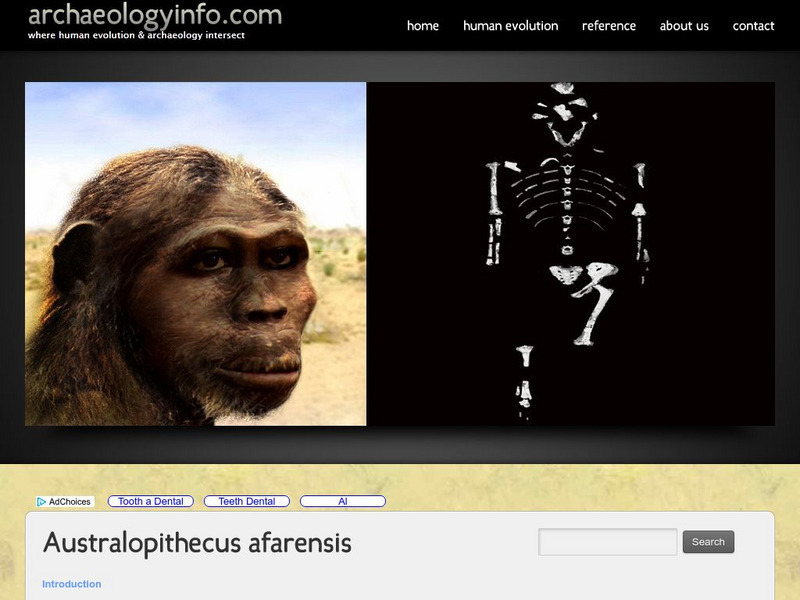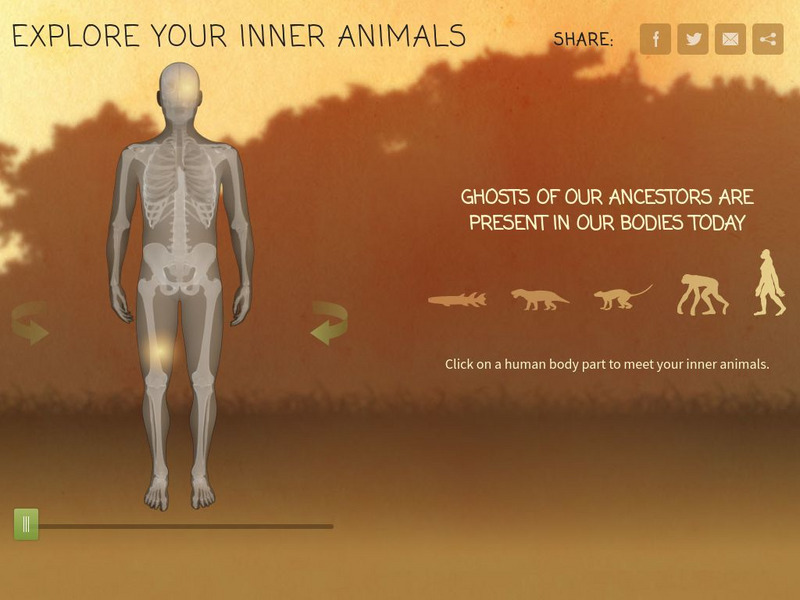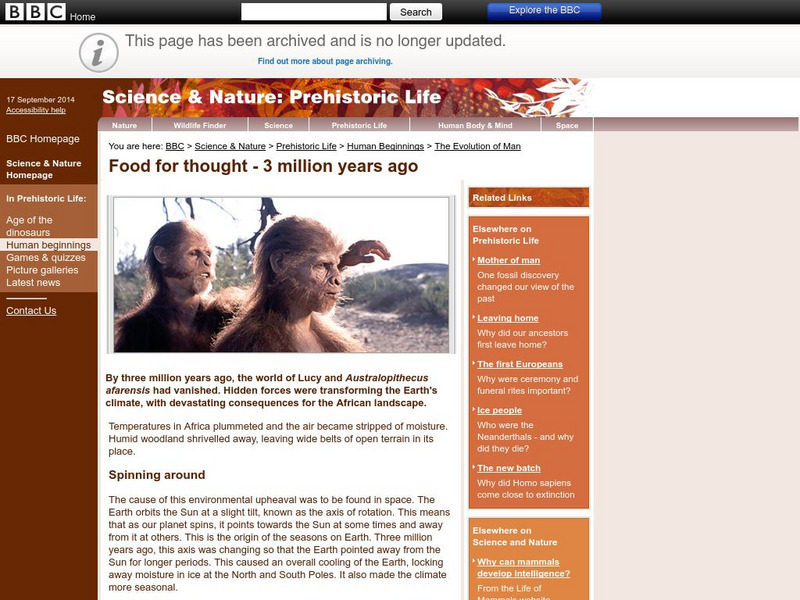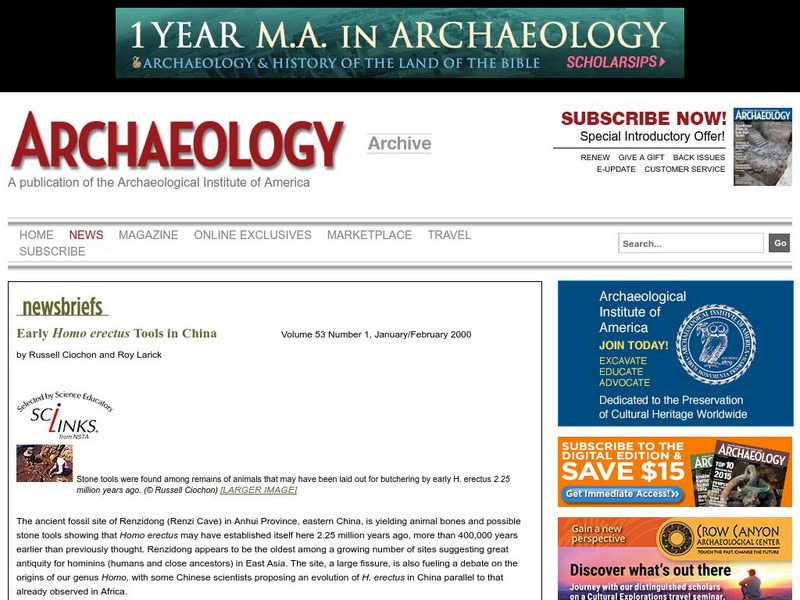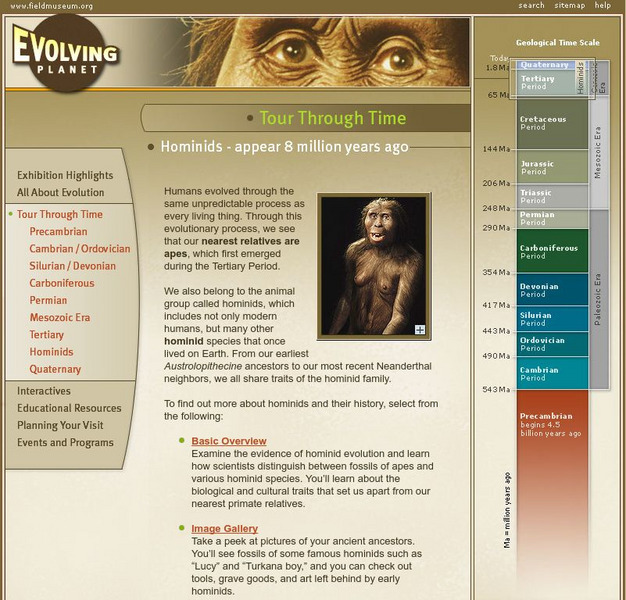Hi, what do you want to do?
Other
Archaeology Info: Australopithecus Afarensis
This site provides information on the Australopithecus afarensis, a species that is believed to be a human ancestor.
Other
Asa: "The Antiquity and the Unity of the Human Race"
This paper, published by American Scientific Affiliation (ASA), explores the possibility of Adam and Eve's existence while addressing both the scientific and biblical-theological perspective.
PBS
Wgbh/pbs: Explore Your Inner Animals
Click on a highlighted portion of the skeleton to open up a brief video presentation and written summary explaining how that part of the human has come from our ancient ancestors.
Howard Hughes Medical Institute
Hhmi: Bio Interactive: Explore Your Inner Animals
Did you know parts of our body was inherited from distant animal ancestors? In this interactive students will investigate different anatomical features of the human body to reveal our evolutionary history. Learn how humans share...
Other
Cartage: Discovery of Early Hominids
This comprehensive essay provides a brief history of the Australopithecines an in depth discussion of the discovery of the early fossils, and a look at the ancestors of the Australopithecines.
Khan Academy
Khan Academy: Activity: Hunter Gatherer Menu
Understand the diet of our foraging ancestors through this exercise. At the end of this exercise, students will be able to compare our diet to our ancestors.
Khan Academy
Khan Academy: Threshold Card: Threshold 6 Collective Learning
A collective learning infographic on the unit of how our ancestors evolved.
Khan Academy
Khan Academy: Lucy and the Leakeys
An article that discusses the Leakey's investigations to find human origins in Africa.
BBC
Bbc: Science and Nature: Three Million Years Ago
Take a trip back to three million years ago and learn about the different animals and their land that relate to the evolution of man. This article offers a look at the challenges and changes faced by our ancestors and suggests several...
Other
Bringing History Home: Immigration History
This 2nd grade unit invites children to learn their ancestors' native countries of origin. The take-home page for family ancestry offers several alternatives to citing a specific family immigration history. Studying immigration provides...
BiologyWise
Biology Wise: A Comparative Analysis: Homo Habilis vs. Homo Erectus
Describes Homo habilis and Homo erectus, two early ancestors of humans. Discusses how they were discovered, their characteristics, and what we know about them, with the information clearly laid out in a chart along with some comparative...
Science Struck
Science Struck: Lucy: The First Hominid Skeleton
Read about the archaeologists who discovered the first Hominid skeleton and other ancestors of humans.
Archaeological Institute of America
Early Homo Erectus Tools in China
An article which describes a fossil site in eastern China where evidence has been found that Home erectus may have been active in eastern China some 400,000 years earlier than scientists believed. The authors also summarize the debate...
Science Buddies
Science Buddies: Now You See It, Now You Don't! Test Your Peripheral Vision
The survival of our ancient ancestors depended on their ability to use peripheral vision to find prey and to avoid predators. Almost everything we do-from riding a bike, to dribbling a basketball, to reading a book-depends on peripheral...
The Field Museum
Field Museum: Exhibits: Evolving Planet: Hominids
In this effective exhibit, you will examine hominid evolution, view pictures of our ancient ancestors, and delve into three trends in hominid evolution that brought humankind into the modern era. A video is also provided where you will...
Other
Cartage.org: Australopithecus Afarensis
This essay provides a picture along with brief physical description of one of modern man's earliest ancestors.
PBS
Pbs Learning Media: Genetic Variation
This video segment from NOVA: "Cracking the Code of Life" explores the genetic similarities and differences among organisms.
TED Talks
Ted: Ted Ed: Why Wildfires Are Necessary
Our early ancestors relied on lightning to cause forest fires, from which they could collect coals and burning sticks to help them cook food and clear land. Yet, it wasn't just humans who benefited from these natural phenomena. Even as...
Countries and Their Cultures
Countries and Their Cultures: Shona
The Shona-speaking peoples comprise about 80 percent of the population of Zimbabwe, with significant groups in Mozambique. Most of what follows applies to the Shona in Zimbabwe, who have been extensively studied. There are now around...
BiologyWise
Biology Wise: Theories Behind the Extinction of Neanderthals
Discusses the discovery of Homo neanderthalensis and describes the different theories that have been put forward to explain why Neanderthals became extinct.
Curated OER
Unesco: Argentina: Cueva De Las Manos, Rio Pinturas
The Cueva de las Manos, Rio Pinturas, contains an exceptional assemblage of cave art, executed between 13,000 and 9,500 years ago. It takes its name (Cave of the Hands) from the stencilled outlines of human hands in the cave, but there...
Khan Academy
Khan Academy: Jane Goodall
A biography of Jane Goodall can be found on this site. Learn about her life and work with the chimpanzees.





